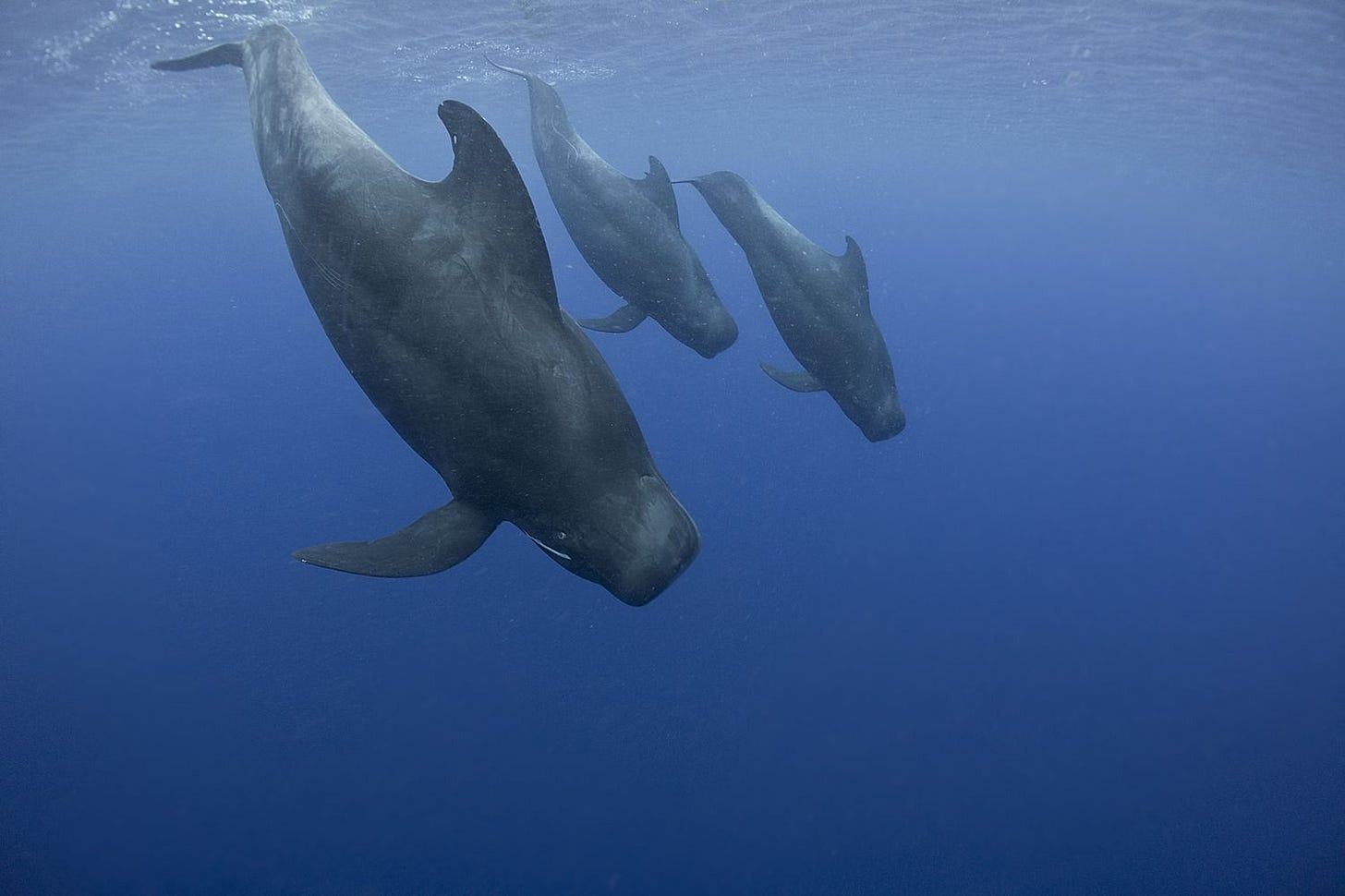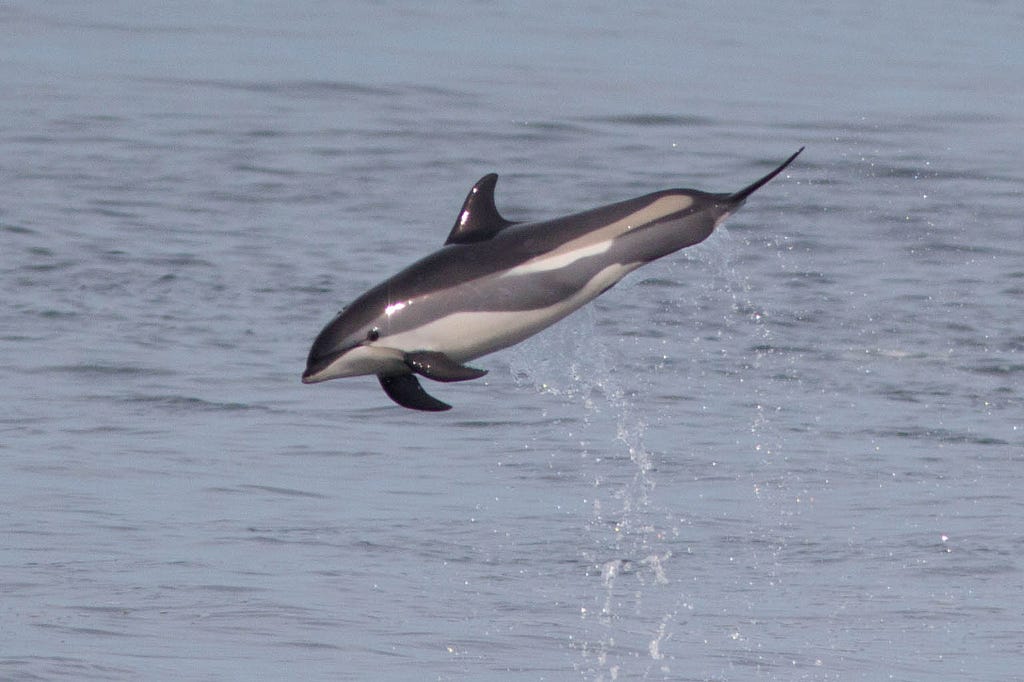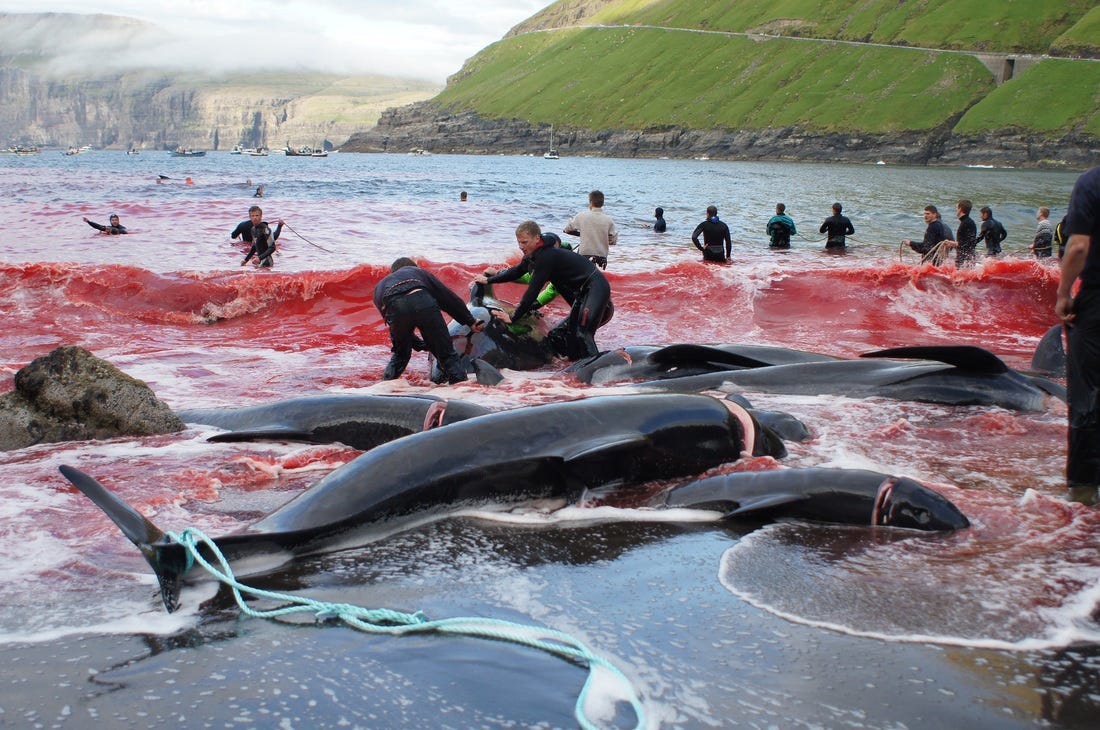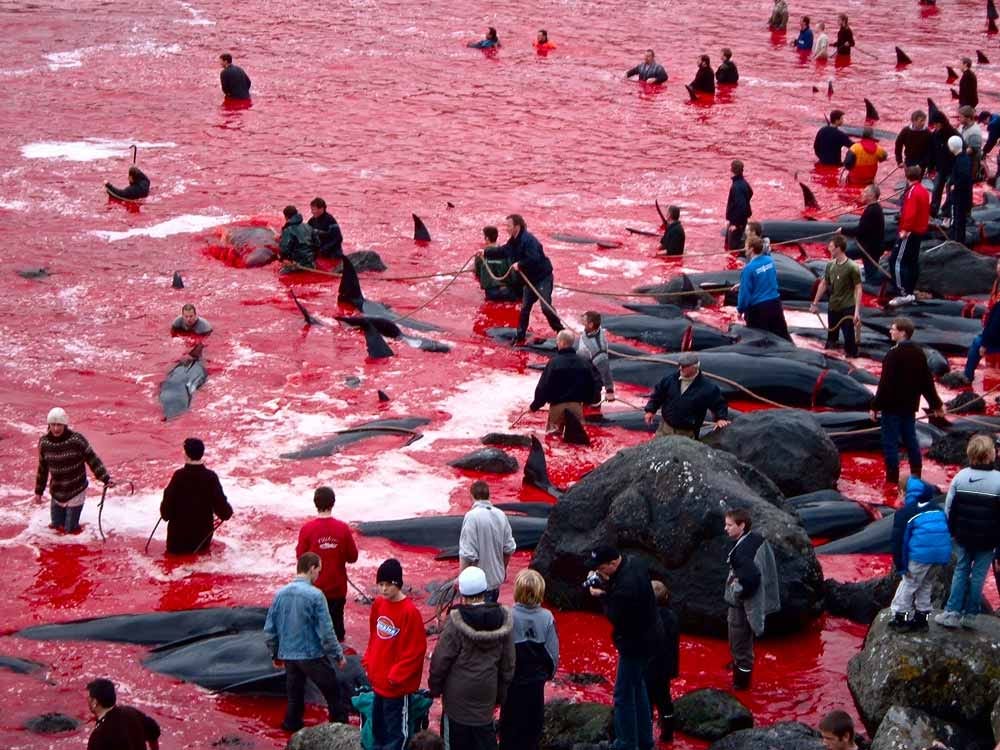The sea runs red with blood
The Grindadráp of the Faroe Islands
Pilot whales, despite their name, are one of the largest oceanic dolphin species, second only to the orca. They are easily distinguished by their polished dark grey skin, verging on black, and for their globular head. Referred to as a melon, this bulbous feature is found in all toothed cetaceans. It aids them in living in an underwater world immersed in sound as they can modulate and recognise what and where others are in the big blue. Living on a diet of squid and large fish gives some explanation to their size, as both species (long-finned and short-finned) are rather robust for a dolphin, which is likely why they’re mistakenly referred to as a whale instead.
The gregarious nature of these dolphins means they are often found in the company of other smaller cetaceans and they have been known to congregate in their hundreds. Their highly social nature and pod cohesion creates particularly strong familial bonds and they stay with one another for life. As wholesome and devoted as that sounds, unfortunately it leaves them vulnerable to one of the most egregious acts of human-on-animal violence still being committed today.
The act of whaling has always shaken me. How can these gentle giants of the sea, roaming free in an endless aquatic arena, become susceptible to the cunning of man and his designs? How can a creature who maintains life so vigorously be caught and cut down? The same pertains here for the pilot whales. Cornered together in a bay. To be slaughtered. By man.
Such is my shock at this behaviour that when I first heard of the Grindadráp1 I thought it was a one off event, an attack, a disturbing crime against marine-kind. I did not expect to hear that it is actually an annual affair conducted by the Faroese people.

The Faroe Islands are an archipelago situated between Norway and Iceland2 in the North Atlantic Ocean. Despite being 230 miles north-west from mainland Scotland they’re an autonomous territory of Denmark. This medley of cultures is perhaps why the Faroese are so dedicated to such an archaic part of their heritage. To have something which is theirs and has been for centuries.3
Unfortunately, this heritage is especially gruesome and cruel. 800 cetaceans, primarily long-finned pilot whales and some Atlantic white-sided dolphins, are massacred on the shores of the Faroe Islands every year.
Usually occurring during the spring and summer months but with no fixed hunting season, the Grindadráp is a type of drive hunting. This involves herding the pilot whales by attaching stones to lines and chasing them until they become cornered in the shallow bays. The pilot whales will ultimately beach themselves as they have nowhere else to go. The Faroese men (women aren’t allowed to take part in the Grindadráp but watch on from the shore) then take their mønustingari, a whaling knife, and make a deep incision through the dorsal area which severs the spinal cord. Once dead, as much blood as possible is drained from the bodies in order to preserve the meat, which is why the water and beaches run such a vivid red. Hunts like this can last for several hours and whole pods may be wiped out in one go.
These practices are naturally graphic in nature and the horrifying scenes in full display on beaches have shocked onlookers, leading to public backlash. In response, certain amendments were made with the intention of lessening the pilot whales suffering. The use of a mønustingari became a legal requirement in 2015 to ensure a quicker death. A 2013 Whale Hunt Law states that whales must either be ashore or stuck to the seabed before they can be killed. The hunters also require a special licence. It is now illegal to harpoon the whales at sea or to attack any outside of the encircling net.
But do these amendments really lessen the pilot whales suffering? Is there emotional trauma lessened? Or their stress? Or their panic? Are their familial bonds not stronger than ever as they’re subjected to this savage ambush? And even if it were lessened, does that make it any better, if they’re still experiencing these horrors one way or another?
I’d like to preface that I am against any and all animal cruelty whether it be for sport, for meat, for cultural traditions or otherwise. The annual hunt of pilot whales is a barbaric and unnecessary practice and in the same breath I oppose the dog trade in China and battery cage factories across the world. However, as I am writing a newsletter about marine life and its wellbeing, this event particularly bothers me.
Pilot whales are highly intelligent. We know this because captive individuals have been trained by the US Navy to retrieve objects from the ocean floor. They are incredibly emotionally intelligent too. They show protective and loving behaviour to one another, whether it be a mother to her calf or among interspecies friendships. This connection and bond makes the Grindadráp more horrific than we could ever imagine as these tight-knit groups bear witness to the killing of their entire pod, including pregnant mothers, juveniles and weaning calves.
They aren’t the only ones hunted in the bay either, as Faroese legislation permits the killing of Atlantic white-sided dolphins, common bottlenose dolphins, white-beaked dolphins and harbour porpoises. All intelligent creatures. All part of a deeply connected social group. All mindlessly extinguished with the same whaling knives. All except for the harbour porpoises who are killed with shotguns. This tells us that the regulations brought in to ease the suffering of these dolphins are only attempts to shake off the public outrage and global attention – not out of any real respect for these animals.

The practice of whaling in the Faroe Islands dates back to 900 AD so I can understand why the Faroese feel that this is an important part of their history and something they’re not going to give up so easily. However, just because something is a tradition doesn’t make it okay. Scotland and the Shetland Islands gave up dolphin drive hunts centuries ago. There are many medieval laws and traditions that would be bizarre, inhumane and foolish to still abide by in today's modern age. The same applies in the Faroe Islands. Especially as they do not need pilot whale meat for sustenance like they once did. It is no longer their main source of food.
The commercial selling of pilot whale meat tells us that this practice now goes beyond their claims of cultural tradition. A recent amendment to their national legislation made it legal to sell the meat from hunts commercially. The Faroese newspaper ‘Dimmalaetting’ declared that single pilot whales carcasses are being sold to supermarkets for 25,000 Kronur4 each, which is a significant profit for the hunters. Also, as the Faroe Islands are only 230 or so miles from mainland Scotland they are supplied by sea and by air with food and products from all over the world. This means that the one or two stores in every Faroese town of around 1000 people, serve up the same nutritious food that the rest of us eat.
One way of tackling this unchecked violence against cetaceans is to demand the Faroe Islands be held accountable under Danish jurisdiction. As the Faroe Islands are included in the Kingdom of Denmark, under European Union legislation , the Grindadráp would be completely illegal. However, the Faroe Islands are not a part of the European Union and so through this loophole they are excluded from any punishment, despite receiving substantially beneficial subsidies from Denmark and the EU every year. Perhaps, sanctions from within the EU are the answer.
Aside from the absurdity and wickedness of the Grindadráp, pilot whale meat is actually a proven health hazard to the Faroese people. Containing high levels of contaminants, chief medical officers Pál Weihe and Høgni Debes Joensen declared the meat and blubber unsafe for human consumption due to high mercury content. Too much of it is particularly toxic for pregnant women and young children and ailments can include high blood pressure, circulatory problems, foetal neural development, and possible infertility.
And finally, what should put a stop to the Grindadráp immediately, is that we don’t know the conservation impact these hunts are having on the pilot whale population, other dolphin populations and the health of the ocean in general. Though in July 2022 the Faroese brought in a hunt quota of 500 animals a year, this is an absurdly high cap based on zero evidence of the health of these populations. A previous Faroese prime minister admitted that there has never been a sustainability study into the hunting of Atlantic white-sided dolphins (or any other dolphin species) living off the Faroe Island coasts. There is also no accurate pilot whale population data and the Grindadráp has not been declared ‘sustainable’ by the Conservation of Migratory Species for this reason. To hunt incessantly in this way, shows a great lack of care for the conservation of any marine species and a breach of what the Faroese claim to be tradition.
Pilot whales and many other dolphin species need our immediate help and protection from the Grindadráp. Sanctions from the EU is one solution as they invoke the law that prevents the ‘reckless disturbance’ of cetaceans including injuring, maiming or killing. In July 2022, UK ministers passionately led the discussion on suspending the 2019 trade agreement with the Faroe Islands, highlighting that with a 157% increase in Faroe Islands’ exports to the UK since the trade agreement “we have the power to make the Faroe Islands focus and resist”.
Show your support to stop the grind by spreading the word and sharing campaign details. Write to your local politician and encourage them to join these discussions if they haven’t already. Sign the petitions and add your voice to the debate, demanding the suspension of the current UK Trade Agreement. Boycott products and services from the Faroe Islands until changes have been made.
We don’t know how many pilot whales are left in the ocean but we do know that the killing of just one more, is one too many.
Stop the Grind. Save the whales.
Grindhvalur meaning pilot whale and drape meaning killing in Faroese.
The coming story is really no surprise when we consider that Iceland and Norway are infamous in the whaling world as they continue to go against the IWC’s 1986 moratorium which put a ban on commercial whaling.
There is evidence that some form of the Grindadráp took place as far back as 1200 AD but definitive records can be found from around 1500 onwards.
Around £150.
Here at Beached we are building a community that can put our brains and resources together to highlight and fund solutions to the problems facing pilot whales and the oceans they live in. I hope you’ll join our humble community and click subscribe for free or support our work by purchasing the paid subscription.
All Beached posts are free to read but if you can we ask you to support our work through a paid subscription. These directly support the work of Beached and allow us to engage in more conversations with experts in the field of marine conservation and spend more time researching a wider breadth of topics for the newsletters. Paid subscriptions allow us to dedicate more time and effort to creating a community and provide the space for stakeholders to come together, stay abreast of each other’s work and foster improved collaboration and coordination.
One day Beached hope to donate a large percentage of the revenue from paid subscriptions to marine conservation organisations and charities to support their work too. Working together, we can reverse the degradation of our oceans.
Amie 🐋





This makes me so sad. I have such a hard time looking at these pictures and totally agree with you. Why is this necessary? 😢